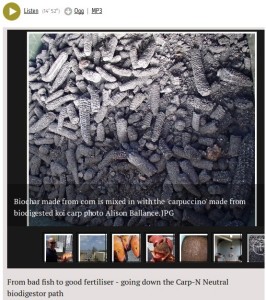I wonder how many of you also follow the discussion groups connected with the world-wide biochar network. There are a lot of great discussions going on. They include eminent authorities such as James Hansen, who is engaged in and with the discussion below.
I like what Benoit says here and you can follow such discussions by signing up to the general biochar group &/or more specific topic groups. You can follow or sign up to two recommendations from the following links…
———- Forwarded message ———-
From: Benoit Lambert <benoit.lambert7@gmail.com>
Date: 25 March 2016 at 08:55
Subject: [SeBIG] Re: [biochar] Re: [soil-age] New Hansen paper on Ice melting impacts makes important points
To: Soil Age <soil-age@googlegroups.com>
Cc: biochar <biochar@yahoogroups.com>, “se-biochar@googlegroups.com” <se-biochar@googlegroups.com>, James Hansen <………@gmail.com>, James Hansen <….@columbia.edu>, ………
“Thank you Ron,
I don’t think anyone says James should do more. lol
But with the scientific facts, and the needed warnings to the world, there is no doubts solutions — all of them win-win-win — have to be presented with a better pitch, to a wider audience. That is a challenge for all of us, from all venues.
In the field of renewable energies and energy efficiency, the Worldwatch Institute and Lester Brown have been doing a great job at announcing better days, for decades. They certainly did better predictions on renewables than the IEA… Today people like Elon Mush and Jigar Shah do the same from an industry, and a financial view point. There is no doubt in my mind that renewables will take over fossil fuel rapidly. Today in many countries, most new electricity today come from wind, solar, and biomass.
Yet it is clear that soils are central to the carbon cycle, and we will not drawdown GtC from the atmosphere and oceans with renewables. We need to reinvent agriculture and land use in general, to feed humanity, fight global warming, reduce pollutions, mitigate erosion/eutrophisation/water shortages and floods. A very good documentary « INHABIT – a Permaculture Perspective » I bought on Vimeo, does a great job at sending this badly needed positive message.
Now, I have been reading big books as Biochar for environmental management, Geotherapy, and currently Carbon farming by Eric Toensmeier. I have listen to hundreds of hours of video on no-till/cover crop, holistic grazing management, permaculture, soil life-web, history of soil degradations by geomorphologist David Montgomery, etc. I refer to those books and experts in my blog that I just renamed Geotherapy Chronicle (hope you don’t mind).
What I see seldom are people that can tell us, with a certain confidence, how we are going to be carbon negative, and how much it will cost. How do you sequester 400 GtC? That is the million dollar question. With you Ron we estimated on this site last year 2-4 billion per ppm, using biochar only. I think this number holds. That would be 1000 billion to get back to normal (300-350 ppm)… cause emissions will obviously not stop tomorrow. A trillion or 1.5% of world economy during one year, not as much as it sounds. In fact the best investment ever…
But what if we mix biochar with compost? What if we use some rock dust, and push permaculture? What if, with biochar, we encourage home-gardens systems, agro-sylvo-pasture, agroforestry and perennial crops, agroecology strategies? What if we do it in regions that have bare, infertile soils, as in Northern Africa? What if we bring in new soil expertise from the soil health / soil-life web experts, or mycorrhizal fungi of Prof André Fortin that has grown forests on rocky sides of dams in Northern Québec… And what about bringing back animals that co-evolved with soils for thousands of years, sometimes creating humus 200 feet deep?
The part that often stays in the air (if I might say) is the stability of carbon versus labile carbon. Biochar appears as the most stable, but more data and research would be welcome. Mind you the terra preta is arguably the longest agriculture experience ever produced. I increasingly believe a land/soil-based, multistrada, multipurpose biological revolution is needed. It could put us on the path to restoration and regeneration, and, by the same token, allow nations to start controlling the carbon cycle.
Best regards, Benoit”
https://groups.yahoo.com/neo/groups/biochar/conversations/messages/19234

